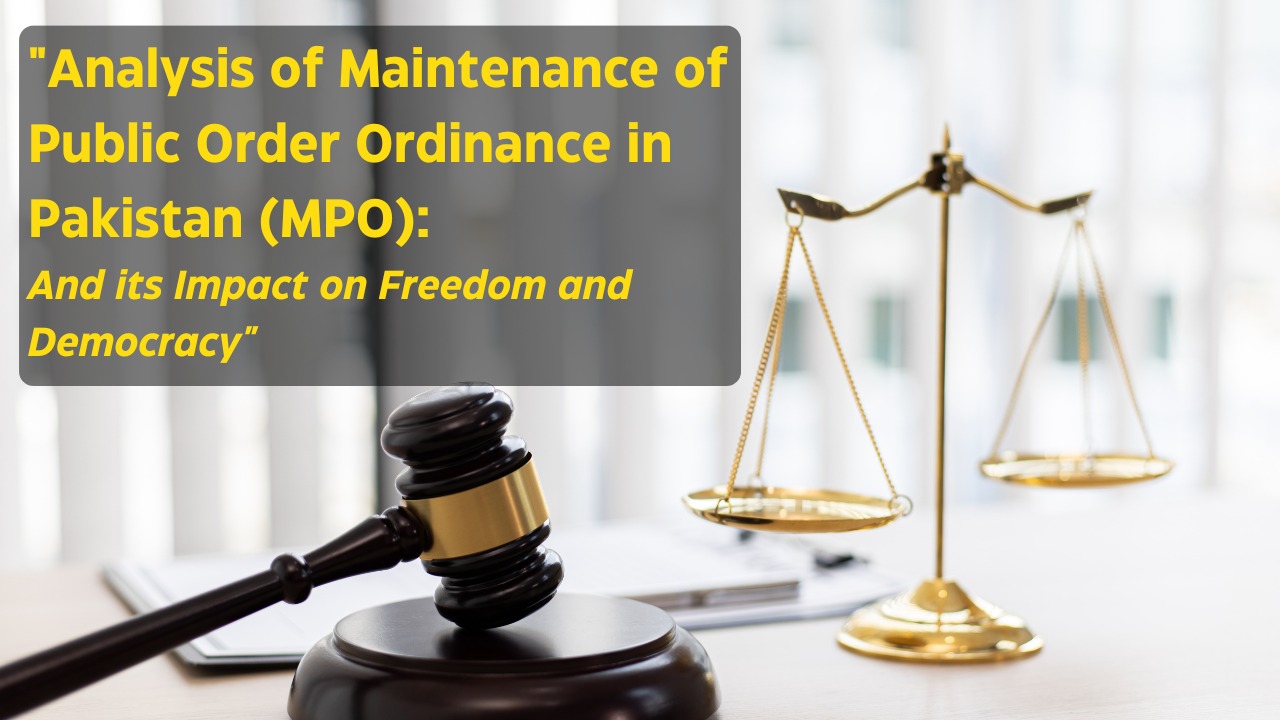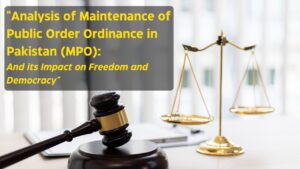
Analysis of Maintenance of Public Order Ordinance in Pakistan (MPO): Its Impact on Freedom and Democracy

Introduction
The Maintenance of Public Order Ordinance in Pakistan serves as a crucial legal framework for maintaining public order and security in the country. Enacted in 1960, this ordinance empowers law enforcement agencies to take necessary measures to prevent crimes, apprehend offenders, and protect public safety. However, concerns have been raised about its potential impact on freedom and democracy. This article aims to critically analyze the Maintenance of Public Order Ordinance, focusing on its implications for freedom and democracy in Pakistan.
Purpose of the Article: This article aims to undertake an in-depth examination of the Maintenance of Public Order Ordinance in Pakistan, with a specific focus on its impact on freedom and democracy. It aims to critically question the potential consequences of this ordinance on the fundamental rights of individuals, particularly with regard to freedom of expression, freedom of assembly, due process, and human rights. By exploring relevant laws, examples, and case studies, this article sheds light on the potential challenges and concerns that arise when balancing public order and preserving democratic values.
With a critical lens, this analysis will highlight any potential limitations or restrictions imposed by the Maintenance of Public Order Ordinance that may hinder the exercising of freedom and democratic principles. By examining the legal framework, its implementation, and its real-world impact, the article aims to foster a deeper understanding of the relationship between public order, freedom, and democracy in the Pakistani context.
Overall, this article seeks to contribute to the discourse surrounding the Maintenance of Public Order Ordinance, raising awareness about its potential implications on individual rights and democratic processes. By critically analyzing the ordinance’s impact on freedom and democracy, it aims to provide insights and provoke thoughtful discussions on the need for a balanced approach to public order management in Pakistan.
Section 3 ofMAINTENANCE OF PUBLIC ORDER ORDINANCE which is in vogue nowadays and commonly called3MPO regards that if the government is satisfied that a person’s acts are prejudicial to public safety he may be arrested/detained without prior warrant.
Understanding the Maintenance of Public Order Ordinance in Pakistan
Overview of the Maintenance of Public Order Ordinance
The Maintenance of Public Order Ordinance, enacted in 1960 in Pakistan, serves as a significant legal instrument for managing public order and ensuring the security of the nation. The ordinance provides a framework for law enforcement agencies to effectively respond to situations that may pose a threat to public safety and order. Key provisions of the ordinance empower authorities to take preventive measures, apprehend offenders, and maintain peace and stability in the country.
Under the ordinance, law enforcement agencies are granted powers to arrest and detain individuals in order to prevent crimes or disturbances to public order. It outlines procedures for dealing with situations that may potentially lead to violence, riots, or other forms of civil unrest. The ordinance also encompasses provisions for regulating public assemblies, processions, and demonstrations, enabling authorities to impose restrictions when necessary to maintain public order.
The objectives of the Maintenance of Public Order Ordinance primarily revolve around safeguarding public safety, maintaining law and order, and preventing acts that could threaten the stability of society. By granting authorities the necessary powers and tools to manage public order, the ordinance aims to protect citizens and uphold the overall well-being of the nation.
Legislative History and Context
The Maintenance of Public Order Ordinance was introduced during a period of political and social turbulence in Pakistan. It was enacted in 1960, during the presidency of General Muhammad Ayub Khan, who sought to consolidate his power and establish stability in the country. The ordinance was designed to address various forms of unrest, including political protests, labour strikes, and communal tensions, which were perceived as threats to the existing socio-political order.
The legislative history of the ordinance reflects the context of the times, characterized by concerns over maintaining social harmony and preventing potential challenges to the ruling regime. It was seen as a tool to empower law enforcement agencies and provide them with the necessary legal framework to effectively respond to situations that could disrupt public order.
Over the years, the ordinance has been subject to amendments and modifications to align with evolving societal dynamics and legal considerations. However, criticisms have been raised regarding its potential impact on individual rights and democratic values, leading to calls for reforms and a more balanced approach to public order management.
Understanding the legislative history and context of the Maintenance of Public Order Ordinance provides valuable insights into its original purpose and the socio-political environment in which it was introduced. Such knowledge helps frame discussions around its current implications on freedom and democracy, allowing for a more nuanced analysis of its impact on Pakistani society.
Restrictions on Freedom of Expression
Impact on Freedom of Expression
The Maintenance of Public Order Ordinance in Pakistan has raised concerns regarding its potential curtailment of freedom of expression and speech. Freedom of expression is a fundamental right that enables individuals to express their thoughts, opinions, and ideas without fear of censorship or retaliation. However, certain provisions within the ordinance can restrict this essential democratic right, impacting the vibrant exchange of ideas and open discourse within society.
Restrictions on the Right to Express Dissenting Opinions
The ordinance includes provisions that can limit the right to express dissenting opinions or criticize the government. These restrictions often aim to maintain public order but may encroach upon freedom of expression. For instance, clauses related to hate speech or incitement to violence might be broadly interpreted, leading to the suppression of legitimate criticism or differing viewpoints.
Examples and Case Studies
Arrests and Detentions of Journalists
Under the Maintenance of Public Order Ordinance, journalists and media professionals have faced legal consequences for their reporting or critical commentary. For instance, cases have been reported where journalists have been arrested or detained for publishing articles or broadcasting content that challenges government policies or exposes corruption. These actions can create an environment of self-censorship and hinder the free flow of information.
Crackdown on Peaceful Protests
The ordinance’s provisions on public assemblies and demonstrations have been used to restrict peaceful protests. In some instances, authorities have used these provisions to disperse or suppress demonstrations organized by civil society groups, political activists, or marginalized communities. This curtails citizens’ ability to express dissent and engage in peaceful advocacy for social change.
Online Speech and social media
The rise of social media platforms has added a new dimension to freedom of expression concerns. The ordinance’s provisions have been used to target individuals expressing dissenting opinions or criticism online. Instances of arrests or prosecutions for social media posts critical of the government or sensitive issues have been reported, leading to concerns about the stifling of online expression.
These examples illustrate how the Maintenance of Public Order Ordinance has been used to curtail freedom of expression in Pakistan. While maintaining public order is essential, it is crucial to strike a balance that upholds the principles of democracy and allows for the free exchange of ideas and opinions within society. A careful examination of these cases and their implications can highlight the need for safeguards to protect freedom of expression in public order management.
Restrictions on Freedom of Peaceful Assembly
Imposing Restrictions on the Right to Assemble Peacefully
The Maintenance of Public Order Ordinance in Pakistan imposes certain restrictions on the right to assemble peacefully. While public order management is a legitimate concern, these restrictions can potentially curtail the exercise of this fundamental right. The ordinance provides authorities with powers to regulate and control public gatherings, allowing them to impose limitations on the time, place, and manner of assembly.
Permissions and Permits for Public Gatherings
One key provision of the ordinance is the requirement to obtain permissions or permits for public gatherings. Organizers of protests, demonstrations, or assemblies are often required to seek prior approval from the local administration or law enforcement authorities. This process can involve submitting detailed information about the event, including its purpose, expected number of participants, and proposed route or location. The authorities have the discretion to grant or deny permission based on their assessment of potential threats to public order.
Suppression and Use of Force against Peaceful Protests
Instances have occurred where peaceful protests or demonstrations have been suppressed or met with force under the Maintenance of Public Order Ordinance. Authorities may employ various measures, including the use of tear gas, water cannons, baton charges, or arrests, to disperse gatherings that are perceived as a threat to public order. This heavy-handed approach can infringe upon the right to peaceful assembly and deter individuals from expressing their dissent or advocating for social change.
Examples include
Crackdown on Political Rallies
Political rallies critical of the government or advocating for political change have been targeted under the ordinance. Authorities have often cited concerns about public order to suppress such gatherings, leading to clashes between protesters and law enforcement personnel.
Repression of Civil Society Protests
Peaceful protests organized by civil society groups, human rights activists, or marginalized communities have been met with repression. Authorities may argue that such gatherings can disrupt public order, leading to the use of force to disperse the assemblies and detain protesters.
Restricting Student Protests
Student movements and protests on educational campuses have also faced limitations under the ordinance. Authorities have used it to curtail student protests, citing potential disruptions to public order and the smooth functioning of educational institutions.
These examples highlight the potential limitations and challenges faced by individuals and groups seeking to exercise their right to peaceful assembly in Pakistan. Balancing the need for maintaining public order with upholding the right to assembly is crucial for a democratic society that values freedom of expression and allows citizens to voice their concerns, advocate for their rights, and participate in public discourse.
Concerns Regarding Due Process and Human Rights
Concerns Regarding Due Process Rights
The Maintenance of Public Order Ordinance in Pakistan raises concerns regarding due process rights. Due process is a fundamental principle of law that ensures fair treatment and procedural safeguards for individuals involved in legal proceedings. However, the ordinance may pose challenges to these rights, particularly in the context of arrests, detentions, and legal procedures.
Arbitrary Detentions and Arrests without Proper Legal Procedures
Instances have been reported where individuals are detained or arrested under the ordinance without proper adherence to legal procedures. Concerns arise when authorities exercise their powers under the ordinance to detain individuals without sufficient evidence or without following the required process for arrests. This can lead to arbitrary detentions, undermining the principles of due process and potentially violating individuals’ rights.
Impact on Human Rights, Including Freedom from Torture and Fair Trial Guarantees
The Maintenance of Public Order Ordinance can have implications for various human rights, including freedom from torture and fair trial guarantees. There have been allegations of torture or ill-treatment of individuals in custody under the ordinance. Such acts not only violate human rights but also undermine the principles of a just and fair legal system.
Moreover, the ordinance’s provisions may affect fair trial guarantees by potentially circumventing the standard procedures for conducting trials. This can include limitations on access to legal representation, restricted access to evidence, or expedited trials that may compromise the accused person’s ability to mount a proper defence.
The impact on human rights extends beyond the specific provisions of the ordinance itself. It also relates to the broader context of how the ordinance is implemented, monitored, and enforced. The lack of accountability mechanisms and oversight may exacerbate the potential violations of human rights.
Overall, the concerns surrounding due process rights and human rights violations under the Maintenance of Public Order Ordinance highlight the need for a careful examination of its impact on the legal system and the rights of individuals. Ensuring that proper legal procedures are followed, that detentions are not arbitrary, and that human rights are upheld is essential for the fair and just functioning of any legal framework.
Comparison with International Standards and Legal Frameworks
Comparison with International Human Rights Standards
When examining the Maintenance of Public Order Ordinance in Pakistan, it is essential to compare it with international human rights standards. International frameworks, such as the Universal Declaration of Human Rights (UDHR) and the International Covenant on Civil and Political Rights (ICCPR), provide guidelines and principles for the protection of human rights.
Relevant Provisions from International Conventions or Treaties
International conventions and treaties safeguard fundamental rights, including freedom of expression and assembly. For instance, Article 19 of the UDHR recognizes the right to freedom of expression, emphasizing the importance of the free flow of information and ideas. The ICCPR, in Article 21, protects the right to peaceful assembly and guarantees the freedom of association.
Inconsistencies and Areas Where the Ordinance Falls Short
In comparing the Maintenance of Public Order Ordinance with international standards, inconsistencies and areas where the ordinance falls short can be identified. These may include:
Vagueness of Provisions
The ordinance may contain vague or broad provisions that grant authorities excessive discretion. Such ambiguity can lead to inconsistent interpretations and potential abuses of power, which are contrary to the requirement of clear and precise laws under international standards.
Disproportionate Restrictions
International standards emphasize that any restrictions on the right to freedom of expression and assembly must be necessary and proportionate. The ordinance may impose disproportionate limitations, such as requiring permissions or permits for public gatherings, which may restrict the exercise of these rights without a clear and compelling justification.
Lack of Safeguards
International human rights frameworks often stress the importance of safeguards to protect individuals from arbitrary arrests, detentions, or excessive use of force. If the ordinance lacks robust safeguards and oversight mechanisms to prevent human rights abuses, it may not align with international standards.
Restrictions on Online Expression
International standards increasingly recognize the importance of protecting freedom of expression in the digital age. If the ordinance does not adequately address the rights and limitations associated with online expression, it may fall short of meeting international standards in this regard.
Analyzing these inconsistencies and areas where the Maintenance of Public Order Ordinance falls short of international standards provides a basis for advocating reforms and ensuring that the rights of individuals are adequately protected. By aligning national laws with international human rights frameworks, countries can uphold fundamental rights and foster a more inclusive and democratic society.
Recommendations for Reform
Proposed Reforms or Amendments
To address the concerns raised regarding the Maintenance of Public Order Ordinance in Pakistan, several potential reforms or amendments can be considered:
Clear and Precise Language
The ordinance should be revised to provide clear and precise definitions of offences and prohibited activities. This would help prevent arbitrary interpretations and ensure that individuals have a clear understanding of what actions may lead to legal consequences.
Proportional Restrictions
Any restrictions on the right to freedom of expression and assembly should be necessary, proportionate, and narrowly tailored. The ordinance should be amended to ensure that limitations on these rights are justified by a legitimate aim, such as protecting public safety or national security, and are not overly restrictive.
Safeguards for Due Process
Reforms should focus on strengthening due process rights by ensuring that individuals enjoy fair and transparent legal proceedings. This includes guaranteeing access to legal representation, safeguarding against arbitrary arrests and detentions, and promoting fair trial guarantees.
Advocating for a Balanced Approach
It is crucial to advocate for a balanced approach that recognizes the importance of maintaining public order while upholding fundamental rights. The reform process should emphasize the need for laws and regulations that strike a fair balance, allowing individuals to freely express their opinions and assemble peacefully while ensuring public safety and security.
Examples from Other Jurisdictions
There are examples from other jurisdictions where similar laws have been modified or repealed to uphold human rights. For instance:
Reforms in India
The Public Safety Act (PSA) in India, which allows for preventive detention, has faced criticism for potential human rights abuses. In response, the Supreme Court of India has imposed limitations and safeguards to prevent misuse and protect individual rights.
Amendments in South Africa
The Regulation of Gatherings Act in South Africa underwent significant reforms to align with international standards. The amendments aimed to ensure that the law does not unduly restrict the right to peaceful assembly and include provisions for obtaining permits in a transparent and non-discriminatory manner.
These examples demonstrate that it is possible to review and amend laws to bring them in line with international human rights standards. By drawing on such experiences, Pakistan can work towards enacting reforms that protect fundamental rights while maintaining public order.
In conclusion, reforms to the Maintenance of Public Order Ordinance should focus on clear and precise language, proportional restrictions, safeguards for due process, and a balanced approach that upholds fundamental rights. Examples from other jurisdictions serve as valuable references to guide the reform process. By undertaking these reforms, Pakistan can create a legal framework that respects human rights, fosters democratic values, and ensures the peaceful expression of diverse viewpoints within society.
Conclusion
In this article, we have explored the Maintenance of Public Order Ordinance in Pakistan and its implications for freedom and democracy. We discussed the key provisions and objectives of the ordinance, examined its impact on freedom of expression and assembly, and highlighted concerns related to due process and human rights. We also compared the ordinance with international standards and legal frameworks and provided recommendations for reform.
It is crucial to strike a balance between maintaining public order and upholding freedom and democracy. While it is essential to have laws that ensure public safety and security, it is equally important to protect the fundamental rights of individuals, such as freedom of expression, assembly, and due process. A democratic society thrives when diverse opinions can be expressed, peaceful assembly is permitted, and individuals enjoy fair and transparent legal proceedings.
Striking this balance requires careful consideration of the limitations and potential abuses that may arise from laws like the Maintenance of Public Order Ordinance. Reforms should be pursued to address concerns, clarify vague provisions, establish proportionate restrictions, strengthen safeguards for due process, and align the ordinance with international human rights standards.
By fostering an environment where public order is maintained without unduly restricting fundamental rights, Pakistan can uphold the values of freedom, democracy, and human rights. It is through this delicate balance that societies can progress, allowing for the free exchange of ideas, peaceful assembly, and the protection of individual liberties.
Ihsan Ullah has done LLB (Law and Shariah) from Islamia College University Peshawar. He is a practising lawyer in Peshawar. He writes content related to law at The Pakistan Gazette and on his Instagram Page Know The Law.

